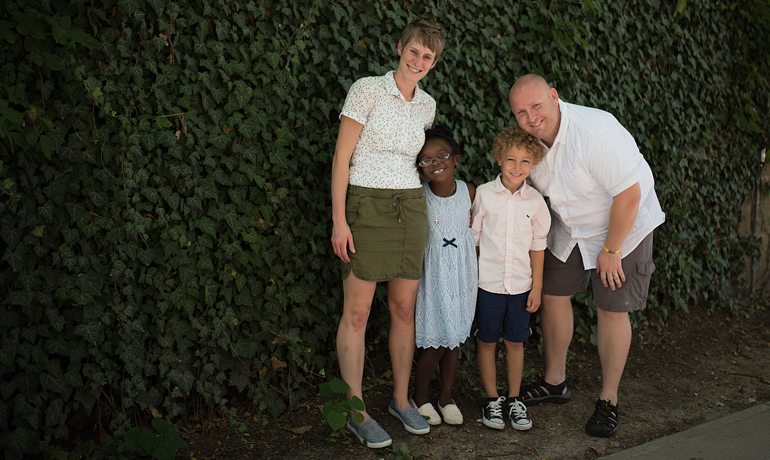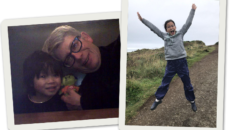Maybe it’s my “mom hair” (thanks, New York Times, for that label), or maybe it’s that I look perpetually tired that encourages near strangers to ask me how many kids I have. At my last dental cleaning, my hygienist (whom I had met only one time prior) asked this very question.
“Two,” I replied.
“Oh! That’s great! How old are they?”
“Seven.”
I tried to stick with one-word answers because a) she had her hands in my mouth and b) our kids’ entrance to our family is complicated. I seldom divulge the details to strangers because I don’t want their story to overshadow who they are as individuals. But this lady just wasn’t picking up on what I was throwing down.
“TWINS!” she squealed.
“Nope. We adopted them both from foster care. They’re two months apart.”
“Oh.” [Pause…more pausing…some brow furrowing.] “Well, that’s just great. That’s so great that you can give those kids a home.”
Those kids is how many people refer to my kids. The phrase rings with an air of pity and a twinge of thankfulness that someone else was willing to step in and adopt those kids. It’s a phrase often used with no harm intended, but the connotations are heavy. My kids aren’t those kids; no kids are those kids…kids in foster care or available for adoption are, simply, kids.
Unfortunately, the conversation with the hygienist continued as she casually scraped the plaque from my teeth.
“Ya know, I had a friend once….”
Oh, God…there’s always a friend, I thought to myself.
“…she and her husband struggled to get pregnant. So, they adopted a child, and right after they were placed with a baby, THEY GOT PREGNANT! Isn’t that something?”
I wanted to tell the hygienist about our infertility. It’s hard for doctors to say pregnancy is impossible when they have two people sobbing in their exam room. Medically speaking, it is highly unlikely you guys will ever be able to get pregnant. Doctors don’t want to destroy anybody’s hope at having children, even when it’s a medical impossibility. I wanted to tell her that we spent much of our savings trying to uncover our infertility, because insurance doesn’t deem exploring infertility as “medically necessary.”
“You see,” my hygienist persisted, “there’s still hope for you!”
It’s a good thing her hands were still in my mouth to prevent me from lashing out. I probably wouldn’t be so frustrated had it been the first time someone told me a similar well-meaning story, but I can’t tell you how many times people have responded to my children’s adoptions with stories about their friends who got pregnant after they adopted, as if adopting brings a person good fortune and solves 97 percent of infertility issues. I can’t tell you how many times people have said “There’s still hope…,” as if adoption were second best.
I wanted to tell my hygienist that, at one time, I wanted to be pregnant with every thread of my being, but over time, my desire to have a biological child disappeared. I wanted to tell my hygienist that, even though I don’t want to be pregnant, I sometimes long for a birth story that would connect me to my husband and connect my kids to me and make me feel more like a “normal” mother in our society.
I wanted to explain that my experience is similar to a traditional mother’s experience. The attachment to a new child is not immediate but a gradual process as mothers move from the abstract idea of having kids to literally holding their children. I didn’t know this before I had kids. When my children moved in after having been in foster care for two and four years, I thought I was expected to love them right away as my own. I loved them, but my kids didn’t feel like mine. It seemed more like an extended babysitting arrangement. When they wanted to share their food with me, I cringed a little because they still felt a bit like strangers—and who wants to share a fork with a stranger? For a few months, I didn’t know how to help them fall asleep or what their favorite foods were. I couldn’t fill out paperwork about their medical history. I couldn’t trace their quirks back to any source. They called me by my first name; their mom was someone else.
Over time, though, they began to feel like my kids. I shared ice cream with them and did not cringe. I learned that J needed his bunny and a back rub to help him fall asleep, and K needed her polka-dot blanket and a nightlight. I learned that J has his birth mother’s curly hair and his daddy’s sense of humor; K has her birth mother’s eyes and my feisty personality. In family team meetings prior to their adoption, I disagreed with caseworkers as I fought like a mother to protect my kids’ hearts from disappointment. In our own time, we accepted one another. I wanted to tell my hygienist that I now love my kids as fiercely as if my husband and I had made them.
But more importantly, I wanted to ask this woman to refrain from telling me there’s still hope for me, as if my life weren’t already fulfilled. My life is complete with my family. I don’t hope for a biological child; I hope for a healthy relationship with my two kids. The way I became a mother may not be preferred for some, but I wouldn’t trade it even for a biological child. I found my kids when I needed them and when they needed me. I wanted to tell this woman, a near stranger, that my kids: They aren’t second best; adoption is not second best. For us, it was the best.
This piece was previously published on Her View From Home.



